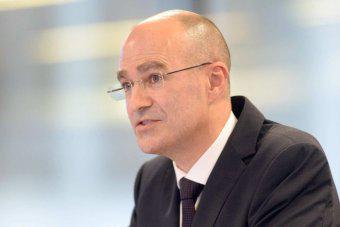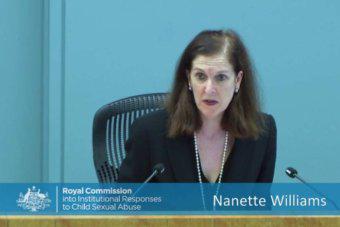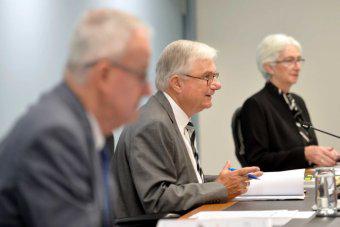|
Royal commission: Sexual abuse victim calls for 'group trials' to be used against offenders
By Nicole Chettle
A man who was sexually abused as a child at an exclusive Sydney Catholic boarding school said he would have preferred for all of the matters against his assailant to have been heard at the same time, an inquiry has heard. The survivor, known as CDR, told the Royal Commission into Institutional Responses to Child Sexual Abuse in Sydney he was abused in 1984 at St Joseph's College, but wished his matter had gone to trial with five other abuse victims. Counsel assisting the commission Jeremy Kirk SC told the hearing Brother John Denis Maguire was found not guilty on 17 counts of child sexual abuse, after six trials and two retrials in 2003 and 2004. Maguire was later found guilty of child sex offences against another boy and in March 2015 he was sentenced to three years' jail, with a non-parole period of one year and nine months. CDR was giving evidence at the hearing which is looking at whether joint trials should be used for people accused of assaulting more than one child in an institutional context. He said he was denied the opportunity of a group trial because the prosecution successfully argued that former students colluded on the matter at a school reunion. "When I thought there would be a joint trial against Maguire I felt positive because it wasn't just my word against his," CDR said. "As soon as I received the notice of separate trials I once again felt isolated and alone. "I was confused by why we as victims were the ones having to defend ourselves." CDR said the process of giving evidence at the trial was also difficult, particularly when a group of schoolgirls entered the courtroom to observe proceedings.
He said a newspaper article published in 2004 detailed the fact Maguire had been acquitted after eight separate trials. "I couldn't help but feel sorry for the jurors. I would hate to have delivered a not guilty verdict only to discover through the media that there were in fact more complainants that I was unaware of." He said he thought separate trials benefitted offenders and victims should have the option of asking for a closed court. "To this day I can not understand why there were eight separate trials against Maguire when all complainants were from the same school, all abused within a three-year period. Most of whom were abused in the same year." 'Isolating one complainant makes it seem less likely'Crown prosecutor Nanette Williams, who oversaw the trials against Brother Maguire, told the commission the effect of hearing each case separately was "catastrophic ... it was a devastating effect for the outcome". "Instead of hearing the combined evidence ... you hear one person come in and give their story. And isolating that one complainant makes it seem less likely that it happened." Ms Williams said Maguire was held in high regard because he was "a man of the cloth ... a man who was a priest". "I think there is a significant shift in the public's perception of priests' role in society because of what's happened in the last 10 years," she said. "Jurors are much more willing to listen to allegations of sexual abuse made against a priest whereas before, in 2003 ... it was very difficult for a young child as they became a man, to be heard against someone who was held in a position of authority within the church and the community." The royal commission has examined several other case studies, including child sexual abuse in the Catholic Church, the Salvation Army and at music and dance schools. Children most vulnerable due to 'limited ability to communicate'Very young children who have suffered sexual abuse face particular challenges in reporting what happened to them, the commission was told. The inquiry was told children and people with disabilities were the most vulnerable when it came to reporting abuse. Mr Kirk said children and people with disabilities encounter problems when the only evidence of abuse is their account of what happened. "These two groups are among the most vulnerable in the community by reason of their limited ability to communicate." And even if an allegation is pursued, the requirements of oral evidence and cross-examination can be an insurmountable challenge. Mr Kirk said the conviction rate for child sexual abuse was lower than for other criminal matters. The hearing continues.
|
.
Any original material on these pages is copyright © BishopAccountability.org 2004. Reproduce freely with attribution.


